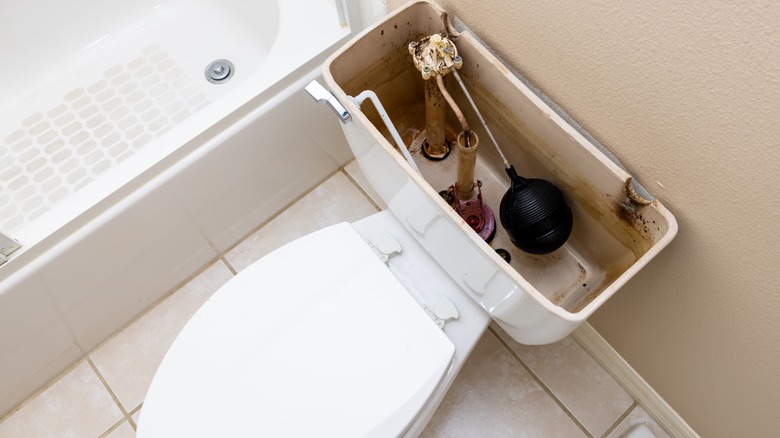Take These Steps To Remove Rusted Bolts From Your Toilet Tank
There comes a time in every toilet's life when its relationship with the homeowner expires. You might need to part ways because it's leaking, wobbly, or simply past its prime. But there's just one thing keeping you from replacing your toilet – the rusted bolts holding the tank in place. Since exposure to water and humidity can corrode metal bolts, they fuse tightly to the toilet tank. This can be frustrating to unscrew the corroded bolts from their awkward positioning on toilet tanks. Fortunately, you just need the right tools, such as a vice grip and a wrench, to remove them. You might also have to apply a little elbow grease.
Just follow the simple steps and you can break through the rust and remove the bolts without damaging your toilet. Before you know it, you'd be saying goodbye to the bane of a plumber's existence and on your way to buy a new toilet for your bathroom.
How to remove rusted bolts from your toilet tank
You only need two handy tools for removing rusted bolts: a vice grip and a wrench. Use the vice grip to hold the bottom of the rusted bolt. This step is crucial since it prevents the bolt from spinning while you loosen it. Adjust the vice grip until it clamps firmly onto the bolt but don't overtighten it. This is because excessive force can worsen the rusted threads and cause further damage. Now, get an adjustable wrench to loosen the top of the bolt. Turn the wrench counterclockwise while keeping the vice grip steady. Rust can slow down your progress, so be patient and continue turning the wrench until the bolt comes loose.
In case the bolt remains unyielding, use a hacksaw or a metal-cutting blade to cut through it and pop the two pieces out. Although helpful, this approach is time- and effort-intensive. To avoid this headache in the future, invest in stainless steel or brass bolts. Additionally, apply a thin coat of anti-corrosion spray to the bolts before installation. Lastly, keep your bathroom well-ventilated to reduce humidity since moisture promotes rusting.
